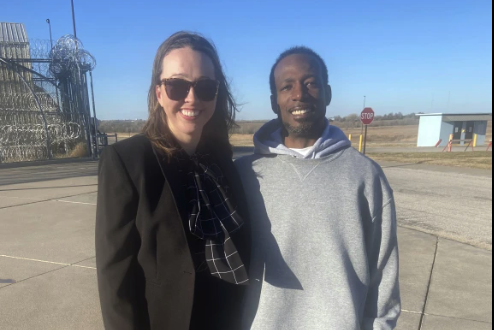Black Man Latest Dead Inmate With Organs Missing In Alabama
Black Man Is Latest Alabama Inmate Found Dead With Organs Missing, Court Documents Show

Source: Newsday LLC / Getty
An inmate at an Alabama jail was missing vital organs when he was found dead, making him the second prisoner revealed to have suffered that fate in a recent series of shocking allegations.
ABC 15 news reported that Charles Edward Singleton was found dead without any organs at all, including his brain, according to court documents filed by the family of another inmate who was found dead in an Alabama jail without his heart in his chest.
Singleton, who is Black, was hospitalized when he died in 2021 while in the custody of the Alabama Department of Corrections. His death was cited in a federal lawsuit filed last week by the family of Brandon Clay Dotson, a white man who was found dead at the Ventress Correctional Facility in November.
The University of Alabama at Birmingham’s (UAB) Department of Pathology performed an autopsy on Singleton but has said it is not in possession of his organs.
“In an autopsy, organs and tissues are removed to best determine the cause of death. Autopsy consent includes consent for final disposition of the organs and tissues; unless specifically requested, organs are not returned to the body,” UAB said in a statement. “UAB is among providers that – consistent with Alabama law – conduct autopsies of incarcerated persons at the direction of the State of Alabama. A panel of medical ethicists reviewed and endorsed our protocols regarding autopsies conducted for incarcerated persons.”
As of Thursday morning, it remained unclear what happened to Singleton’s organs and Dotson’s heart, the latter of which was only noticed missing upon a second autopsy performed by an independent pathologist hired by family members.
While there were no direct mentions of possible organ harvesting – “the selling and transplanting of the organs of victims,” as defined by the International Society for Human Rights – the illegal practice has been unofficially linked to at least one other high-profile case in recent years.
In 2021, the same year Singleton died, 25-year-old Illinois State University graduate student Jelani Day was found dead under questionable circumstances after going missing in the state. Day’s mother claimed her son’s body was found missing some of his vital organs as well as his jaw, which was reportedly “sawed out.”
Day, like Singleton, was Black.
Citing Day’s mother and her attorney, the Chicago Sun-Times reported that the “family’s private forensic pathologist” didn’t find a brain, liver or spleen, among other organs, in Day’s body during a second autopsy.
While Day’s mother later recanted her statement about her son being found with missing organs, his siblings said they were “NOT taking organ harvesting off the table” but respected their mother’s wishes to not make that a focal point of the media coverage surrounding the suspicious death.
Illinois Rep. Bobby Rush ultimately requested a federal review of Day’s case.
“As I learned the details of Day’s case, I was reminded of the lynching of Emmett Till, whose body was found floating in a river in 1955 and still, decades later, no one has been held legally accountable for his death,” Rush wrote in a letter to FBI Director Christopher Wray and U.S. Attorney General Merrick Garland. “The circumstances surrounding Day’s death are strikingly similar to past lynchings of Black Americans, both male and female.”
Organ harvesting was also initially suspected in the death of Kenneka Jenkins, a teenager found in a hotel freezer in suburban Chicago in 2017. However, a local coroner determined Jenkins’ death was an accident while she was intoxicated.
SEE ALSO:
Tyre Nichols’ Legal Team Hopes DOJ Can Reign In Terror From Specialized Police Units
‘White Privilege’: Jasmine Crockett Rips Nancy Mace, House Republicans At Hunter Biden Hearing
















